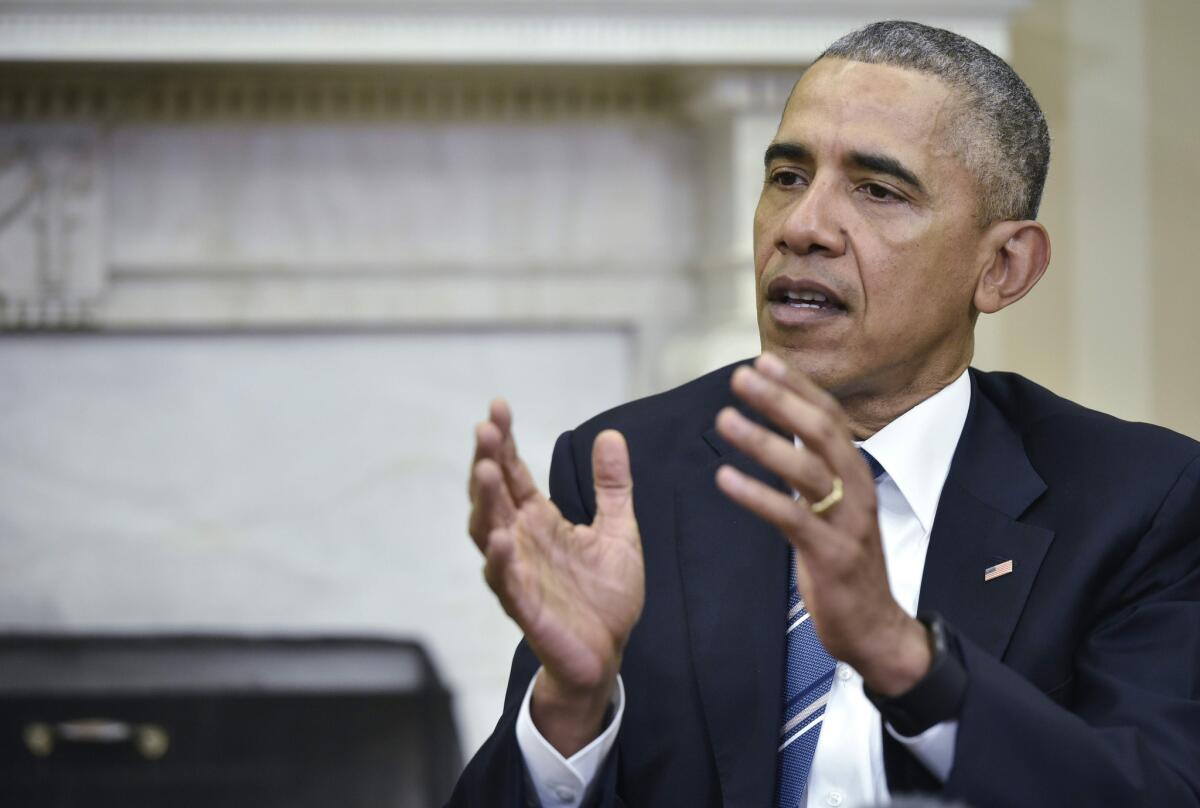Obama says if GOP won’t consider his Supreme Court pick, the entire judicial system is at risk

President Obama speaks in the Oval Office of the White House on Wednesday.
Reporting from Washington — President Obama vowed Wednesday to press ahead with a Supreme Court appointment despite Republicans’ insistence that he leave the choice to his successor, calling their position so unprecedented it risked the integrity of the U.S. judicial system.
“I’m going to do my job,” Obama told reporters in the Oval Office, promising to nominate a candidate to the high court with “impeccable legal credentials” while arguing that the GOP’s position would threaten the political neutrality of the federal courts.
“What you’re going to see is a further deterioration in the ability of any president to make any judicial nomination,” he warned.
“And at that point, not only are we going to see more and more vacancies and the court systems break down, but the credibility of the court itself is diminished because it’s seen as an extension of our politics.”
The president’s stern comments came a day after Senate Republican leaders not only repeated their view that the Supreme Court vacancy be unfilled until after the November election, but suggested they would not even give a potential Obama nominee the courtesy of a personal visit.
Senate Majority Leader Mitch McConnell (R-Ky.) repeatedly insisted Tuesday that “the decision ought to be made by the next president.”
“I have many faults, but getting off-message is not one of them,” McConnell said in the face of a barrage of questions at his first news conference since the Feb. 13 death of Justice Antonin Scalia. “In short, there will not be action taken.”
Politics aside, the comments from both sides this week obscures the reality that neither is likely to get what it wants in the end.
For Republicans, there’s the prospect that their unprecedented action to deny a Supreme Court nominee even a courtesy call will calcify the public’s view that they are obstructionist, a conclusion McConnell has worked studiously to turn around. Democrats hope that the nomination fight will hurt the handful of Republican incumbents facing reelection this fall, or at least strengthen their own argument that the GOP-led Congress has produced only more gridlock.
For Obama and his fellow Democrats, even if Republicans break from their position and allow a nominee to face a hearing and a vote, there’s no guarantee his pick would ever serve a day on the court. Fourteen Republicans would ultimately have to cross the aisle to give the nominee the 60 total votes needed to overcome a filibuster and be confirmed.
In deeply polarized Washington, 14 votes is a nearly insurmountable hurdle. Neither of Obama’s previous two nominations to the high court got more than nine Republican votes.
For now, Democrats are more hopeful than confident that simply getting to a hearing would lead to the final result they want.
“When you have the hearing, the world focuses. The American people focus. The Senate focuses. And things happen,” said Sen. Charles E. Schumer, the No. 3 Senate Democrat.
The White House declined to comment on a Washington Post report that Nevada Gov. Brian Sandoval, a Republican and former district court judge, was being vetted for the post at the behest of Senate Minority Leader Harry Reid (D-Nev.).
“I suspect it is only the first of many stories that speculate on potential Supreme Court nominees, and I don’t think it will be helpful for me to get into a rhythm of responding to each one,” Press Secretary Josh Earnest said.
In the 10 days since Scalia’s unexpected death, conservatives and liberals have batted back and forth old comments that expose contradicting views on filling a Supreme Court vacancy in a presidential election year.
This week, Republicans pounced on comments Vice President Joe Biden made in 1992 as then-chairman of the Senate Judiciary Committee, imploring President George H. W. Bush to leave a potential vacancy unfilled until after the election to come.
Biden expressed that view about three months before the election, not eight, his office noted, and it involved a hypothetical vacancy.
Sen. Charles E. Grassley of Iowa, now chairman of the Judiciary Committee, alluded to Biden’s comments in a letter to McConnell signed by the panel’s 11 Republican members vowing not to hold a hearing. “This is not a difficult or novel constitutional question,” he and the panel’s 10 other Republicans wrote.
Join the conversation on Facebook >>
Not all Republicans agree.
Sen. Susan Collins of Maine, one of just two sitting Republicans who supported both of Obama’s nominees, Sonia Sotomayor and Elena Kagan, said she believed the Senate had an obligation “to carefully consider any nominee whom the president submits.”
But she also criticized the president for supporting a filibuster against Justice Samuel A. Alito Jr. in 2006, when Obama was a senator.
“So the president has done a complete 180 on this issue,” she said.
The White House has said Obama does regret that filibuster. Obama himself suggested Wednesday that Republicans were hardly committed to their own position now.
“I get the politics of it,” he said, adding that he’s expressed sympathy to several Republicans in private conversations in recent days.
“And, by the way, there’s not a lot of vigor when they defend the position that they’re taking. … They’re pretty sheepish about it when they make those comments.”
For more White House coverage, follow @mikememoli.
ALSO
What you need to know about the search for Scalia’s successor
Trump wins Nevada caucuses, fortifying his lead in the Republican race
Republican elite are shifting their thinking on Donald Trump: ‘You know, this could happen’
More to Read
Get the L.A. Times Politics newsletter
Deeply reported insights into legislation, politics and policy from Sacramento, Washington and beyond. In your inbox three times per week.
You may occasionally receive promotional content from the Los Angeles Times.











